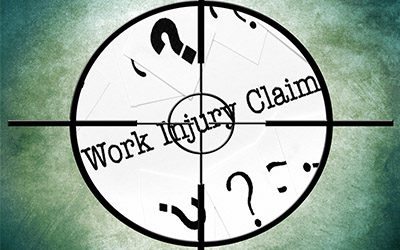Workers Compensation
If you’ve been injured at work, you may be entitled to full compensation. This compensation can reach tens of thousands of dollars and may pay for medical treatment for your injuries as well as wages for any work you missed.
You may be compensated for the following:
-Medical bills resulting from the injury
-Recovery costs
-Wages lost due to injury

Check now if you qualify for full workers compensation, it’s 100% free
Workers compensation is an insurance purchased by employers simply for the total coverage of employment-related injuries and illnesses. Most states require a certain form of this compensation and it largely depends on the type of industry a business operates. For instance, companies in the construction industry are nearly universally required to acquire Workers compensation. Still, at the end of the day, it offers the same general idea. Think of this compensation as a system of laws that outlines specific benefits to which an injured worker is entitled to, as well as the procedures required in obtaining it.

What Is a Workers Compensation?
Regardless of work or position, employees who get injured while doing the company’s job are eligible to get Workers compensation benefits. And yes, this continues while they recuperate from the injury or illness acquired. While the claim process is pretty much straightforward, there are a number of specific guidelines (more on this below) used in determining whether an injury or illness qualifies for the said compensation. There are also various procedures that the employee needs to follow in order to file a proper claim. Contrary to popular belief, this compensation is nothing similar to a lawsuit filed against an employer. It is rather a request for benefits akin to that of an insurance claim.
The Significance of Workers Compensation Law
The Workers compensation laws are specifically crafted to guarantee that employees receive fixed monetary or support whenever they get injured or ill. And it is also meant to file claims without them having to litigate anything against their employers. Hence this compensation is deemed an important safety net for workers whenever something bad happens to them as a result of performing tasks or job.
It is worth noting that most, if not all, of these laws are also there to provide employers a certain level of protection. This is usually done by providing a limit to the amount an employee can get from their employees and, in most cases, prohibit injured workers from ever suing the company. By essence, Workers compensation is merely a no-fault system, where an injured worker’s own negligence – or the negligence of the co-worker or employer – is not considered an issue. Rather, the injured employee is simply meant to receive financial coverage for his/her work-related injuries or illnesses.
Hence Workers compensation is often coined an “exclusive remedy” with respect to an injury or illness obtained from work unless a third party is involved or contributed. For instance, employees are likely to be injured by the company’s very own products or machinery, and thus they may seek compensation. However, employers are not meant to be directly involved in any third-party claim of their respective employees. These claims rather take place in civil actions, instead of involving the Workers compensation system. There are cases, though, where employers can provide such compensation to their employees despite the involvement of a third-party.
In most states, both the insurer and employer of the compensation can enter into a lawsuit commenced by employees and find a way to protect their right to recuperate the sums. There are also states that allow employers to give a lien against their employee’s recovery. This is where the insurer and the employer must wait until the employee reaches a successful recovery, a point they can easily assert the lien. From there, the employee is required to pay back monies which are consistent to the Workers compensation benefits previously acquired or acquirable.
Difference Between Workers Compensation Benefit Claims and Civil Lawsuits
Workers compensation is typically considered an apt substitute for a lawsuit against a certain employer or company. In order to prevent an employee from suing an employer, he/she is entitled to the said compensation, and this does not fall under any fault for the injury or illness. Before this compensation’s conception, employees were given no choice but to file a lawsuit so they can acquire compensation. Nowadays, employees are automatically given with Workers compensation and, at the same time, the employer gets protected from any form of employee lawsuit.
It is important to remember, however, that even after filing a Workers compensation claim, an employee may still be able to bring a lawsuit for certain reasons. For starters, if the employee is injured by someone other than the employer, he/she is likely to proceed with a lawsuit. The same thing can happen if the injuries or illnesses are acquired through a defective product or faulty equipment.
The Scope of the Compensation’s Coverage
Workers compensation and its coverage still vary by state and, more importantly, by occupation. For example, some states exempt certain types of workers from the compensation system, including, but not limited to, agricultural, domestic, and independent (contractors). Others require coverage if and only if an employer employs a minimum number of employees or workers. Note: If a person is not covered by the compensation, he/she may be able to proceed with a civil claim against an employer or third party, whichever is applicable.
The Types of Expenses the Compensation Covers
Benefits are given to survivors (i.e. immediate family members) of employees killed on the job
Medical care provided for the injury or illnesses
Permanent Injuries Compensation
Retraining Costs
Replacement Income
If an employee files or claims a Workers compensation, he/she is no longer eligible in suing an employer. And this kind of compensation does not necessarily cover any sort of pain or suffering.
As for wage replacement, it is mostly two/thirds of a worker’s average wage, though there is sometimes a fixed maximum amount that the benefit will not go beyond. It is safe to say that the compensation is modest, especially that it is not taxed. So, as long as an employee was earning a fair wage, he/she should have not any issue whatsoever. The wave replacement eligibility starts immediately once a few days of work are missed due to the existence of a certain injury or illness.
Long-Term and Permanent Injuries
Apparently, Workers compensation is the kind of insurance that covers both long-term and permanent injuries. Hence it is not limited to any incidental accident. It even covers illnesses or problems that develop over a long period of time of doing similar injurious activities. An epitome here is the carpal tunnel syndrome (more about this below) or back problems acquired from repetitious and strenuous movements.
While most types of employees are automatically covered by this compensation, most states commonly practice the exclusion of some workers, such as:
- Business owners
- Casual workers
- Private home employees
- Farmers and farmhands
- Maritime employees
- Railroad workers
- Volunteers
Since employees working in the federal government are already compensated under the federal Workers compensation insurance program, they are – and will always not be – covered by the state-level compensation. There are even states that do not enforce this compensation on employers that have fewer (usually 3 to 5) employees working for them. Again, this largely varies from one state to another.

Frequently Asked Questions
Absolutely yes! You can always sue your employer or company for any reckless – particularly intentional – action that resulted in an injury or illness. But if you choose to go with this, you will automatically waive your right to Workers compensation insurance. And if you are successful, the court may even award a broad range of damages, including, but not limited to, punitive damages, lost wages, medical expenses, mental anguish, and pain and suffering.
No, and he cannot even fire you. As a matter fact, most states prohibit this law particularly. If your employer tends to retaliate against your filing of Workers compensation claim, you report your employer immediately to the nearest local Workers compensation office.
While it is true that your employer can never fire your for filing a compensation claim, you might still get fired for some other reasons. One example is being absent from work due to your injury. Sure, you can obtain the compensation, but your employer may fire you for reasons within business matters.
Any injury or illness caused by a work-related accident or condition is, by default, covered by the Workers compensation insurance. Heck, you may claim compensation even if the fault of your injury is you.
The only injuries or illnesses deemed uncovered by the compensation are the following:
• Self-inflicted injuries, with suicide being a huge example
• Injuries obtained from intoxication or illegal use of drugs
• Injuries caused by a co-worker’s attack for personal reasons
• Injuries caused by a person unrelated to the company or employer
• Injuries caused by the workplace for reasons not related to the job
Some injuries are acquired in but do not necessarily happen during the work period. This includes traveling from home to work or when taking breaks. They do not qualify for the Workers compensation, though this is a still a case to case basis.
Yes, and this is best exemplified by carpal tunnel syndrome. As long as you can prove, in one way or another, that your injury is work-related, then you can easily claim Workers compensation in no time. Whatever kind of injury obtained from repetitive motions automatically falls under the said compensation.
By law, your employer is required to provide with this compensation, whether he likes it or not. And this compensation, albeit determined for factors mentioned above, must cover the entire employees of the company. Of course, if you are self-employed or you work remotely, it is very unlikely for you to receive this compensation. Apparently, though, some employers these days still neglect the vital role of this compensation. Like car insurance, they also neglect to carry it.
You may be eligible for this compensation if you either hurt on the job or aggravate an already-existing injury. Even more so, your employer is required to give you this if you end up developing a work-related illness. If you are only traveling to and from work (or taking breaks) and you get hurt, then you are not eligible for this compensation.
Yes, you always can. Workers compensation laws empower you to collect payment for work-related injuries regardless of whoever is at fault. But again, if it is self-inflicted or intentional, you are not covered by the compensation.
The perfect examples of workers who have no fixed place of work are consultants and traveling medical experts (e.g. doctors, nurses, physician, etc.), among others. They are an exception, however. That is because they are immediately covered by Workers compensation once they hit the road and are on the clock. For instance, if you are a salesman and you are required to travel to somewhere else. If something bad happens, you are eligible to receive payments for treatment or recovery.
As mentioned, breaks are among the reason why you will not be eligible for this compensation. The general rule of thumb is any personal time taken during working hours – lunch breaks being an epitome – will not be covered by the compensation.
It actually depends on whether the aggravation is a recurrence of an old injury or it is simply new. If you have medical proof that you acquired a new injury and that it is related to your current job, then you will be eligible to receive Workers compensation payments.
It is important that you notify your employer or company as soon as you get hurt or injured. Some states like Pennsylvania void this compensation if an employee fails to inform his/her employer within 120 days. Regardless, it is important that you let your employer know about your injury or illness right away.
Top Workers Compensation Law Firms

Goldberg & Dohan
The Firm specializes in representing injured persons and their families against corporations and insurance companies.

The Walthew Law Firm
The Walthew Law Firm has helped injured people on the job or through the negligence of others. Their attorneys have the experience to get compensation for their clients as quickly as possible.

Fields law firm
Fields Law Firm focuses on one thing: helping injured and disabled workers throughout Minnesota. They are one of the largest and most respected Workers Compensation and Disability Law Firms in Minnesota.

Dworkin Maciariello
Attorney Bradley S. Dworkin has authored newspaper articles, appeared on television, and spoken at union hall meetings throughout the state of Illinois.
Check now if you qualify for full workers compensation, it’s 100% free


